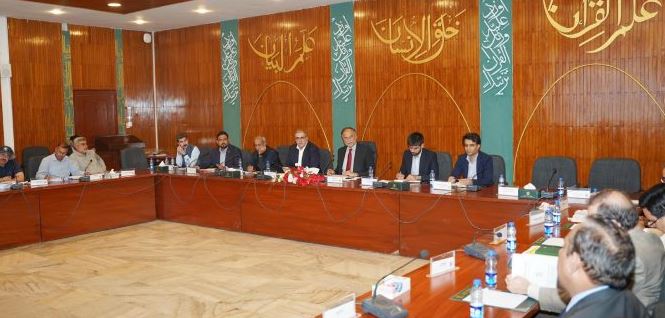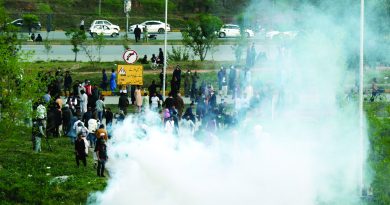Ahsan Chairs 81st meeting to review progress on the CPEC projects
Ahsan Champions ‘URAAN Pakistan Data Centre’ to drive data-driven Planning
APP
ISLAMABAD: The 81st meeting to review progress on the China-Pakistan Economic Corridor (CPEC) projects was held in Islamabad under the chairmanship of Federal Minister for Planning, Development and Special Initiatives, Ahsan Iqbal.
The session brought together key stakeholders to assess ongoing developments across sectors including infrastructure, power, petroleum, water resources, food and agriculture, and Special Economic Zones (SEZs), said a press release issued here on Wednesday.
During the meeting, the Karakoram Highway (KKH) project came under discussion, where it was shared that a Chinese technical delegation is expected to visit Pakistan shortly to review various aspects of the project, particularly its financial feasibility.
In preparation for the visit, the Minister called for all concerned institutions to finalize the minutes of relevant working group meetings and ensure readiness ahead of the upcoming 14th Joint Cooperation Committee (JCC) meeting.
The Minister also emphasized the significance of the CPEC Review Meeting as a key decision-making platform for ensuring timely progress of projects.
He underlined the importance of active participation from all relevant ministries and departments to maintain momentum and coordination under the broader CPEC framework.
The forum noted that the JCC session is likely to be held in the near future. To this end, the Minister directed conveners of all Joint Working Groups (JWGs) to hold their internal meetings during July 2025.
He also encouraged JWGs to develop clear, actionable proposals regarding the potential extension of CPEC to Afghanistan and to share them with the CPEC Secretariat at the earliest.
Progress reports from ministries were also discussed.
The Minister appreciated the submissions made by some ministries and encouraged others to submit their updates in the prescribed format to ensure uniform proposal and alignment with overall project timelines.
The meeting also reviewed developments related to power supply for CPEC SEZs. The Minister reaffirmed the government’s commitment to supporting industrial growth through reliable energy provision and highlighted the importance of resolving outstanding issues on a priority basis.
He underscored the need for a coordinated strategy to expedite infrastructure development and ensure smooth power connectivity for zones like Rashakai.
On the Siah Diq Copper Mine Project in Chaghi, the Ministry of Petroleum was requested to examine the broader regional potential of copper resources and evaluate the viability of establishing a smelting plant . The timely completion of feasibility studies was emphasized to maintain alignment with investment timelines.
The Ministry of National Food Security and Research informed the forum that agricultural equipment has been distributed to all provinces.
The Minister recommended gathering feedback and utilization reports from provincial governments to ensure effective implementation.
Regarding Gwadar’s 1.2 MGD desalination plant, the Ministry of Maritime Affairs and Gwadar Port Authority were requested to submit a comprehensive operational plan outlining key components such as water tariff structure, supply area mapping, and defined operational responsibilities.
The Minister also proposed organizing an inauguration ceremony to mark the operationalization of the plant, reinforcing the government’s focus on improving basic services like water and electricity in Gwadar.
The meeting was attended by Secretary Planning Awais Manzor Sumra and senior officials from the Ministry of Foreign Affairs, Ministry of Interior, Ministry of Communications, Economic Affairs Division, Power Division, Petroleum Division, Board of Investment, Ministry of National Food Security and Research, Ministry of Science and Technology, Ministry of Information Technology and Telecommunication, Ministry of Maritime Affairs, Ministry of Industries and Production, Gwadar Development Authority, and the CPEC Secretariat.
Federal Minister for Planning, Development and Special Initiatives, Prof Ahsan Iqbal on Wednesday visited the Pakistan Bureau of Statistics (PBS) where he was given a comprehensive presentation on the dynamic data collected by PBS during the historic first digital census and other censuses and surveys.
The presentation highlighted the immense potential of this data for effective and efficient planning, implementation, and monitoring of development and economic growth interventions under the Uraan Pakistan initiative, said a press release issued here.
During his visit, the Minister also toured the state-of-the-art URAAN Pakistan Data Centre, which stands as a cornerstone for modern governance. The meeting was attended by Chief Statistician Naeem uz Zafar and other senior officials from PBS and the Ministry of Planning, Development and Special Initiatives.
The URAAN Pakistan Data Centre, a Tier 3 facility, provides a comprehensive view from the national level down to the household level, encompassing population demographics, economic indicators, trade, social sectors, household facilities and services, industries such as agriculture and livestock, and governance statistics. “URAAN Pakistan Data Centre is laying the foundation for modern and transparent governance,” he remarked.
The Minister, Prof Ahsan Iqbal, highlighted that this will facilitate the Government at all levels and the private sector, especially businesses, for data-driven planning and decision making; academia and researchers for deep analysis; and the general public for information.
The Minister suggested that PBS’s next goal should be to transform available data into useful products and tools.
He urged that data be collected according to the needs of chambers of commerce, private sector, researchers, and academic institutions.
Ahsan Iqbal underlined that sustainable development is not possible without education, and the real capital of any nation is its human resource. He noted that the success of the government’s 5Es (Exports, Energy, Environment, Education, and E-Governance) also hinges on authentic data.
He expressed satisfaction that Pakistan’s economic indicators are once again showing signs of recovery and reiterated the government’s commitment to achieving the goal of transforming Pakistan into a $1 trillion economy by 2035.
“Data is fuel- for audience based decision making to address issues such as energy, export, food security, and employment,” the Minister said. He added that data is key to identifying underserved regions and guiding youth employment and skills development initiatives.
He further said that policy and planning processes must now rely heavily on disaggregated and credible data. On the directives of Minister of Prof, Ahsan Iqbal, the data is presented both by administrative units and by electoral constituencies. Minister Prof Ahsan Iqbal said that presenting data at the constituency level will help elected representatives “see progress in their constituency and will ignite a conversation around growth and development.” He added that this approach will “foster healthy competition” among elected officials, shifting the focus from political mudslinging to measurable development and economic progress.
Speaking further, Minister Prof Ahsan Iqbal emphasized that the detailed, disaggregated data will fuel all planning, development, implementation, and monitoring activities under government initiatives. This data-centric approach is critical to achieving the ambitious goal of transforming Pakistan into a $1 trillion economy by 2035. He described this shift as moving towards scientific and precision planning, ensuring ultimate transparency and accountability. “Data is the fuel of decision-making in a modern economy,” he said, “and thanks to the URAAN Pakistan Data Centre, we now have the foundation for modern, transparent governance.”
Chief Statistician Naeem uz Zafar detailed the technical capabilities of the URAAN Pakistan Data Centre, which aligns with international standards and is built on a highly virtualized infrastructure. The primary site is located at PBS Headquarters in Islamabad, with a fully equipped Disaster Recovery (DR) site in Lahore. The Data Centre provides robust computing, storage, and networking capabilities to support PBS’s evolving data needs over the next decade. High-end servers ensure substantial computing power and memory for complex processing tasks. The centre includes over 700 terabytes of storage capacity, comprising a 512TB SAN storage system for centralized, high-performance data access, and a 184TB backup appliance to guarantee data protection and continuity through reliable disaster recovery systems.
This initiative reflects the government’s commitment to harnessing authentic, purposeful data for meaningful policy targets — from managing population growth and improving literacy rates to addressing energy, imports, food security, and youth employment. As Minister Iqbal put it, “Now, under the vision of the Prime Minister, we are moving towards precision planning and decision-making with complete transparency and accountability, powered by the URAAN Pakistan Data Centre.”



